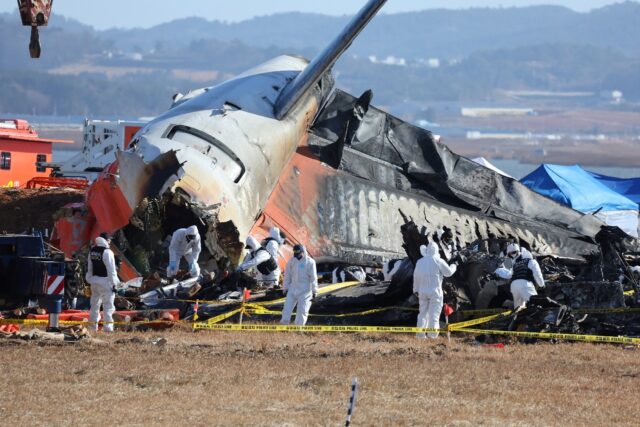South Korean authorities said Tuesday they were investigating the role of a concrete barrier at the end of Muan airport runway in the country’s worst air disaster, which killed 179 people as a Jeju Air jet crashed on landing.
US investigators, including from Boeing, were at the crash site in southwestern Muan, officials said, as South Korean authorities began assessing two black boxes retrieved from the burned-out wreckage of the aircraft.
The plane was carrying 181 people from Thailand to South Korea when it made a mayday call and belly-landed before hitting the barrier and bursting into flames, killing everyone aboard except two flight attendants pulled from the burning wreckage.
Acting President Choi Sang-mok, who has only been in office since Friday, said the accident was a “turning point” for the country, calling for a full overhaul of air safety systems.
He urged officials to “thoroughly reexamine the overall aircraft operation system… and immediately address any necessary improvements.”
Officials initially pointed to a bird strike as a possible cause, but experts have also flagged the barrier, with dramatic video showing the Boeing 737-800 bursting into flames as it collides with it.
When asked whether it was permissible for the airport to have used concrete in the barrier, director-general for airport policy Kim Hong-rak said the government would “review the relevant regulations and their application”.
“Whether this structure exacerbated the damage is… something the Accident Investigation Committee plans to investigate thoroughly,” said deputy minister for civil aviation, Joo Jong-wan.
“At this stage, it is important to avoid focusing solely on any particular factor as the definitive cause of the accident,” he said, adding investigators were reviewing “all potential scenarios to ensure a thorough investigation.”
Jeju Air CEO
Jeju Air CEO Kim E-bae said that there were “no specific or unusual issues during the maintenance process” of the aircraft.
“As for whether the landing gear functioned properly, that is directly related to the accident investigation, and we are not in a position to know at this time,” he told a press conference.
South Korea is observing seven days of mourning over the disaster, with New Year celebrations cancelled and flags flying at half-mast.
Officials began releasing the bodies of plane crash victims to families Tuesday, while investigators at Muan airport combed over the wreckage of the fuselage.
Soldiers picked carefully through the fields around the airport, as people left ritual offerings for victims — including food and letters — near the airport’s perimeter.
“Captain, first officer, and crew members, thank you so much for doing your best to save the passengers. I pray for your eternal rest,” one letter left on the fence said.
Inside the airport, where victims’ relatives have been camped out since Sunday waiting for information, anger was growing over delays in identifying passengers on the doomed plane.
“Of the 179 victims, the bodies of four have completed the handover procedures to their bereaved families for funerals,” transport minister Park Sang-woo said at Muan airport.
Funerals for some victims who had been identified and completed autopsies began Tuesday, he added.
Black box analysis
One family lost nine members — including the oldest passenger on the plane, who was taking his first-ever overseas trip to celebrate his birthday, local broadcaster KBC reported.
The passenger, surnamed Bae, was travelling with his wife, his two daughters, one son-in-law, and four grandchildren, including a five-year-old.
The entire family was killed, with only one of the daughter’s husbands — who was not able to join the trip — left behind to face the loss of his wife and three children.
“Yesterday, the village chief went to Muan airport and said the son-in-law was in utter despair, saying, ‘I should have gone with them and died with them,'” KBC said.
Memorial altars for the victims have been set up nationwide, including in Seoul and at Muan airport itself.
The plane was largely carrying holidaymakers back from their year-end trip to Bangkok, with all passengers Korean nationals, except for two Thais.
A fuller account of what went wrong in the flight’s final moments is expected once authorities have analysed the black boxes.
“Regarding the black box, surface contamination cleaning has been completed at the testing and analysis centre, and its condition is currently being assessed,” deputy civil aviation minister Joo said.
“However, the flight data recorder’s data storage unit is still under evaluation,” he said, as it was found with a missing connector.
Technical reviews are underway to determine how to extract the data.

COMMENTS
Please let us know if you're having issues with commenting.